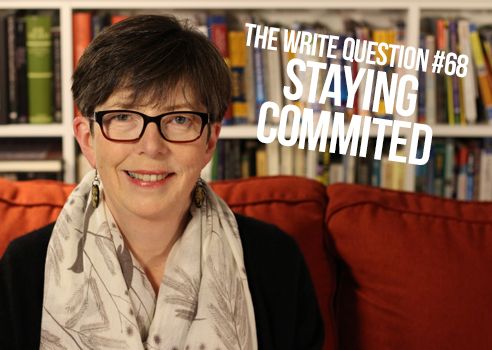Viewing time: 5 min. 50 sec.
The Write Question is a weekly video podcast about writing that I started in 2017 and that ran, more or less weekly, until April 2022. This is a republication of issue #68, with advice on staying committed to your book. The post first ran on Oct. 5/18.
Transcript:
Welcome to The Write Question, I’m Daphne Gray-Grant and my topic is how to stay committed to your book.
I have a question from Nancy Holmes, a writer who lives in New York City. Here’s what she’s asked.
“I’m wondering if you can suggest how I can stay committed to my book. I’m in the middle of it right now and I’m starting to get a bit discouraged.”
Thanks for your question, Nancy. There’s no doubt that the “middle” is the toughest point for most projects. Why? Well, think about the feelings surrounding the beginning of anything. We’re excited. We haven’t yet encountered any of the problems. We’re only beginning to start the hard slogging work.
And now, consider the end. Sure, there are many long hours and maybe the odd crisis or two to deal with, but — yay! — the finish line is in sight! That positive feeling keeps us knuckled down and motivated. Who isn’t willing to work a few late nights when we know the project is just about done?
But the middle? That’s the point that really sucks. We’ve encountered many of the problems. In fact, the middle is the precise point when the problems seem most intractable! We’ve worked long and hard. And we still haven’t seen any of the payoffs. We feel exhausted and discouraged and broken down.
Is it really worth the effort? we might ask ourselves. And it might seem that the answer is no.
But having navigated a number of big projects myself I can tell you that it usually IS worth the effort. To help get yourself through the messy middle, you’re going to need some endurance and some organization.
I was speaking with a colleague this week who has written 200,000 words for her 80,000 word book. Yes, those numbers are correct. She’s written way more than she needs.
But she’s actually in the middle right now because she’s decided that only 60,000 of those 200,000 words are going to be able to stay. That means she still needs to write 20,000 more words and then edit the whole thing into a similar tone or voice. She’s tired and worn out, although I know she’s going to do it because she has excellent endurance and she knows how to manage her time.
When you’re in the messy middle, the issue comes down to how well you can pace yourself. Think of marathoners. It’s well known that at the 18-mile mark, runners hit a “wall.” That’s the point where their bodies tell them it’s just not possible to run any further.
What gets them past that? Partly, it’s physical conditioning. But only partly. It’s also mental conditioning. Here are five tips I’ve adapted for book writers from a blog post I just read on marathoning [link below]:
1) Get your language right. Be positive with yourself and focus on your strengths. Don’t say, “I hope I have enough energy to finish this tiresome book.” Instead, say, “I’m good at finishing projects. I’m smart enough to work a little bit every day.”
2) Rehearse coping with the bad bits as well as the desirable ones. Don’t just focus on the wonderful goal of holding your printed book in your hand. Instead, visualize yourself at your computer editing a particularly difficult passage. And see yourself and succeeding at it. How great does that make you feel?
3) Rename your emotions. Fear — the racing heart, the sweaty palms — can become excitement. Frustration can be anger, which leads to determination. Boredom can become the chance to let your mind wander and come up with new ideas. If you can see these negative emotions in a more positive way, they’ll be easier to bear.
4) Set super small goals. A lot of people will write 30,000 words and think, “oh my God, I still have 50,000 more words to write.” That’s overwhelming. Instead, set a small goal — perhaps one chapter — and then work to achieve it. Then set the next one. You can coach yourself through the entire project simply by focusing on one small step at a time.
5) Remember that writing is as much about the process, as the outcome. Winners don’t actually think about winning, they think about putting in a winning performance. Writing a book will not only give you a book at the end of it, it will also make you a person who is capable of writing books. Give yourself the time you need to do this remarkable, inspiring, worthwhile job.
Finally, let me wrap up with a quote from famed Danish novelist Isak Dinesen, author of the book Out of Africa:
“When you have a great and difficult task, something perhaps almost impossible, if you only work a little at a time, every day a little, suddenly the work will finish itself.”
Thanks for the question about how to stay committed to your book, Nancy. Stick out the messy middle and before you know it, you’ll arrive at the excellent end.


